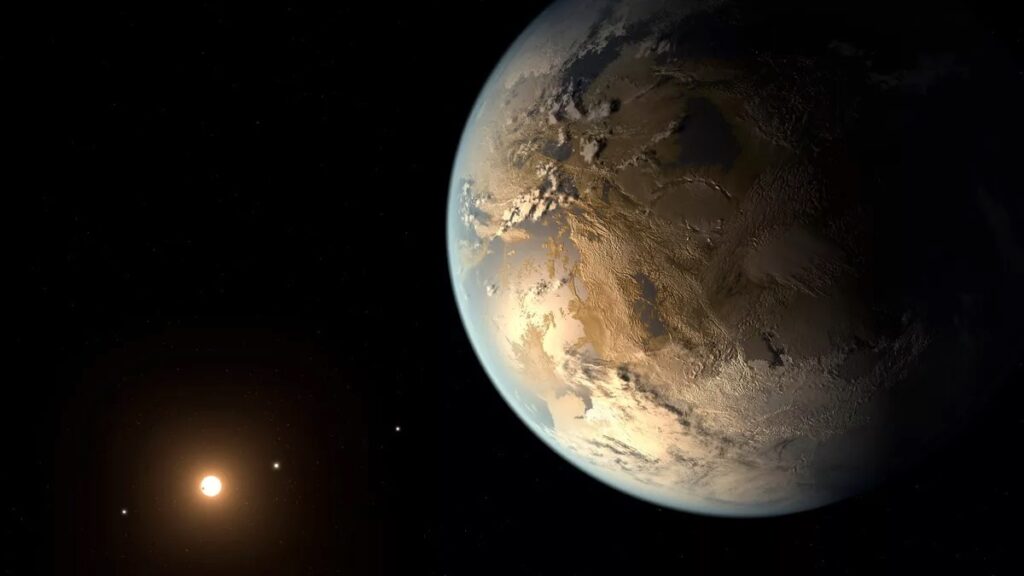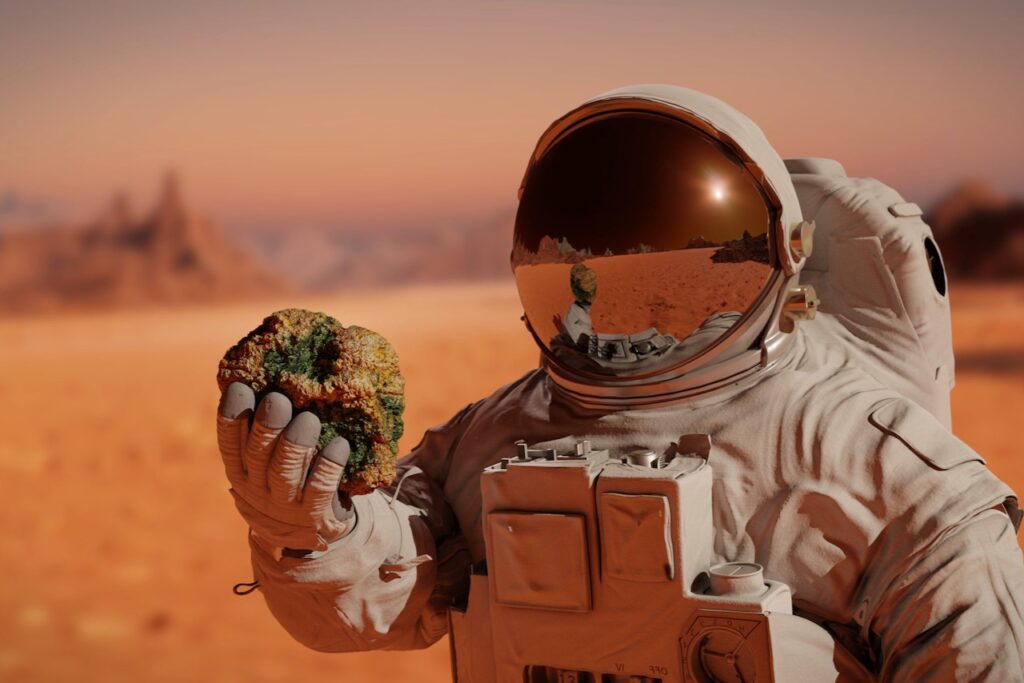Over the past decade, advancements in technology have enabled us to gaze further into the vastness of space. This has led to remarkable discoveries and breakthroughs in the realm of planet discovery. Only last month two potentially habitable exoplanets were discovered! Not to mention that talks of living on Mars have taken a turn from “if” to “when”. Unsurprisingly, the possibility of a habitable planet has sent ripples through the scientific community, sparking the imagination of people everywhere.
The significance of this planet discovery and the advancements towards colonizing Mars cannot be overstated. They have the potential to shift our understanding of the universe and our place within it. It brings us one step closer to answering the age-old question of whether we are alone in the universe. It holds the promise of new frontiers to explore and new lives to be lived. And you thought betting on an up-and-coming neighbourhood was cool and edgy…
The possibility of a habitable planet other than our own is thrillin. However, it’s important to approach the subject with both a sense of wonder and a dose of realism. The fantasy of space travel and extraterrestrial life has been a staple of science fiction for decades. But the reality is that the likelihood of finding another Earth-like planet in which we could actually live in this lifetime is still uncertain. Not that this means it’s not worth looking into, on the contrary.
So buckle up guys, we’re going to space! (not literally though.)
What is an exoplanet?
An exoplanet, deriving from the term extra-solar planet, is a planet outside of our solar system that orbits around a star. Similar to the Earth around the Sun.
Now, why do we care about exoplanets? Because, out of the thousands upon thousands of exoplanets discovered by astronomers throughout the decades, seven of them have been discovered to be in the ‘habitable zone’ of their star.

What is the habitable zone?
The habitable zone, also known as the “Goldilocks zone”, is the sweet spot around a star where conditions are just right for liquid water to exist, a key ingredient for life as we know it. It’s the region where we can imagine life thriving, or maybe even finding a new home.
These new earths in the habitable zones of their stars have the scientific community excited as can be about the palpable possibility of life existing elsewhere than earth. What once appeared to be a distant dream is seemingly getting closer. We used to read about new earths and earth-like planets hosting life similar to human life in comic books. It used to be a common science-fiction movie plot. And now, the discovery of potential planets that can support life has reignited interest in the search for extraterrestrial life. It has given scientists new avenues to explore in the quest for answers about our place in the universe.
Hold your horses, we can’t just move into a habitable planet right away
Even though the discovery of new exoplanets has injected a good dose of hype and hope into the space exploration scene, the Habitable Zone concept is not without its limitations. The mere presence of a planet in the zone does not guarantee that it is hospitable to life. Other factors such as the planet’s atmosphere, surface conditions, and potential for tectonic activity must be taken into consideration. Nevertheless, the Habitable Zone remains a beacon of hope and a guiding light in the search for new earths. It’s a huge win for new discoveries on planets. Specifically, planets that can support life. Maybe. But “maybe” is better than “no”!
Plus, exoplanets aren’t the only path towards living in space. Let’s examine one of the options favoured by many as far as living in space in this lifetime goes. We’re talking, of course, about Mars.
Is there life on Mars? Could that life be us?
Beneath the rusty red hue and dusty surface of Mars lies a planet that has captured the imagination of scientists, space enthusiasts, and the general public alike. Mars, with its proximity to Earth and similar rotational and axial tilt, has long been considered a prime candidate for potential habitation. But it is actually?
Well, if it isn’t, it won’t be for a lack of trying! Who is trying to see if Mars is a habitable planet?

NASA leading the investigation on planets that can support life of course
NASA’s Mars Exploration Program is a long-term effort to study the Martian surface, atmosphere, and potential for habitability. The program has sent several rovers and orbiters to Mars to gather data and information about the planet’s climate, geology, and potential for past or present life. NASA’s next step is to send astronauts to Mars in the 2030s. The ultimate goal? Establishing a sustainable human presence on the planet.
Elon Musk’s SpaceX promises we’ll be living on Mars soon
SpaceX, founded by Elon Musk, has also set its sights on Mars. Musk has been developing its Starship spacecraft intending to eventually send humans to Mars. The company plans to send uncrewed missions to the Red Planet as early as 2024. Hoping to establish a self-sustaining city on Mars in the coming decades.
Jeff Bezos doesn’t want to be left behind in the race to Mars
Blue Origin, founded by Jeff Bezos, has also expressed interest in exploring Mars. It has been working on developing a reusable lunar lander that could eventually be used for missions to Mars. The company has stated that its goal is to help “enable human expansion into the solar system.”
Mars is garnering more attention internationally than it ever has
European Space Agency (ESA) has plans for future missions to Mars, including the ExoMars missions to search for signs of past and present life on the planet. The Roscosmos State Corporation for Space Activities, which is the Russian federal space agency, also has plans for future missions to Mars. The Chinese National Space Administration (CNSA) has also expressed interest in Mars exploration and has planned a Mars sample return mission for the near future. These public efforts from different countries highlight the international community’s growing interested and investment in exploring Mars as a potential habitat for humans.
Truth be told: Mars is not actually all that habitable
All dreams aside, the harsh reality of life on Mars presents numerous challenges for human settlement. Unlike Earth, Mars has a thin atmosphere and lacks a strong magnetic field. This leaves it exposed to the damaging effects of solar winds and cosmic radiation. The planet also experiences wide temperature swings. Temperatures drop well below freezing at night and reach above the boiling point of water during the day.
In addition to these environmental challenges, the surface pressure and temperature on Mars are also inhospitable to human life. The atmospheric pressure on Mars is only about 1% of that of Earth, making it difficult for humans to breathe without pressurized habitats or suits. The average temperature on Mars is a chilly -63°C (-81°F), which would require elaborate and costly infrastructure to maintain livable conditions for humans. An infrastructure that would be incredibly vulnerable to any sort of leak or damage.

Although Mars is currently not a habitable planet at all, scientists did find indirect evidence that there once was life on Mars. Leading them to believe that it is possible to terraform Mars and make it a more hospitable place for future human settlement. So, despite these challenges, the dream of establishing a human settlement on Mars remains a tantalizing possibility and the subject of much scientific inquiry and exploration.
To put it simply: We can’t ignore the limitations of new discoveries on planets
What makes a planet liveable for the human race is a lot more than water, air, and sunshine. There’s much more to it when it comes to determining whether a planet can sustain human life. The perfect mix of atmospheric conditions, temperature, and geological activity play a crucial role in making a planet habitable.
We depend on Earth’s geological record
Earth has a rich geological history. And it’s crucial to understanding our planet’s evolution and the factors that have made it habitable. From volcanic eruptions to tectonic movements, Earth’s geological record provides us with insights into the processes that have shaped our planet and made it the perfect place for life to thrive. Other planets have their own geological record and controlling that in order to have them develop in a way that nurtures human existence seems like quite the mission for this lifetime.
We need Earth’s biosphere to survive
We might take it for granted, but Earth’s biosphere is what makes our planet unique. It provides us with the necessary resources for survival, from oxygen to food. And let’s not forget about its ability to regulate our climate and maintain a stable environment. After all, we can’t forget that we are a very small part of the Earth’s total existence. We have evolved to depend on the billions of other organisms that are part of the fabric that makes up this planet’s biosphere. We can’t go around thinking, or entertaining the fact that there is a planet B we can hop off to something soon if this doesn’t work out.
There is no plan B, there is just our planet
We have yet to discover a “new earth” that is capable of supporting human life. And even if we do, it’s unlikely that it will be a perfect match for our planet. The harsh reality is that Earth is our only home, and there is no “Plan B.” It’s imperative that we take care of our planet and ensure that it remains habitable for generations to come. The discovery of exoplanets and the possibility of finding habitable planets is exciting, yes. But it doesn’t change the fact that Earth is our only home.
The big problem about today’s space exploration panorama
Let’s be honest, space exploration has become the new playground for billionaires looking to flex their wealth and power. And this is where the major problem ensues. Elon Musk and Jeff Bezos, with their shiny toy companies SpaceX and Blue Origin, are more focused on showing off reusable rockets and promoting space tourism for the elite, rather than actually advancing scientific discovery and improving humanity. Guess it’s just pure coincidence that the US offers tax incentives and other legal tax benefits offered to companies engaged in space exploration.

Talk about a narrative of escape and privilege, only the rich have the means to explore and potentially colonize other planets. After, of course, ruining this one, unnecessarily draining all resources for profit. But worry not! Because they’ll come back to visit when they’ve settled into their exclusive space cities so they can look back to their past and be grateful they no longer have to live among the less fortunate. Cause hey, who needs to address poverty, inequality and climate change when you can explore space instead? (Cue in Love, Death & Robots S03E01).
Let’s keep our feet on the ground… For now.
Don’t get us wrong, the advancements made by these wealthy individuals are certainly awe-inspiring, but there’s a bigger picture here we simply cannot miss. The pursuit of habitable planets shouldn’t be about exclusivity and privilege. And it most definitely shouldn’t be about encouraging companies that are disregarding the policies they should follow in order to make our actual planet more liveable by… Oh, I don’t know, maybe paying their fair share of taxes, or not promoting employment infrastructures that are exploitative? Space exploration should be a collective effort to better understand our place in the universe and ensure a brighter future for all of humanity. Not about billionaires looking for their next cash cow because they’ve bled this one dry.

All in all, we think it’s fair to say that while the potential for exoplanets being habitable planets and possibly moving to Mars in the coming decade is exciting… But as far as what that means for humanity at present time, let’s figuratively – and possibly literally too – keep our feet on the ground. The road ahead for space colonization is long. Just how long is uncertain. And we can’t use this space hype to forget that our efforts should be focused on taking care of the planet we know for sure is habitable. The one we already live in.













